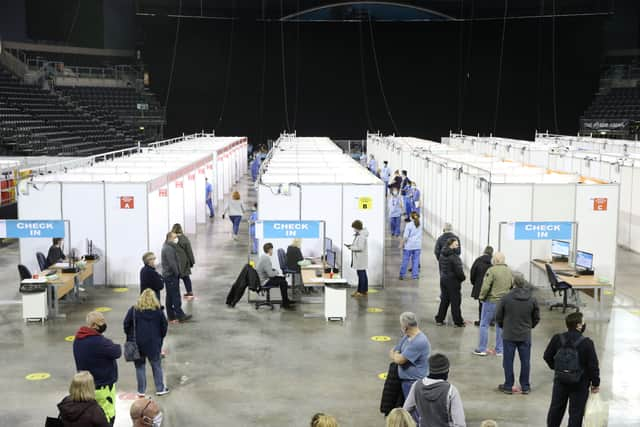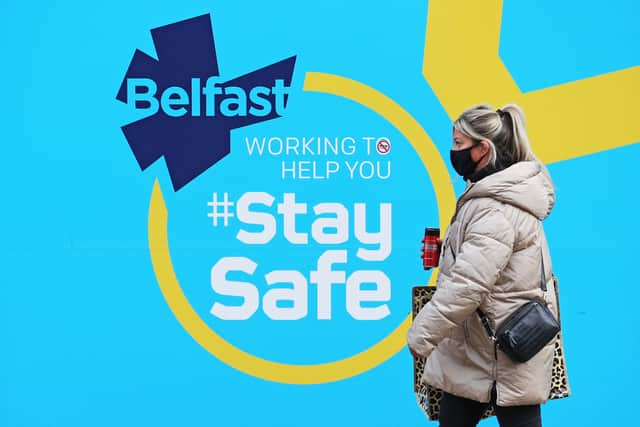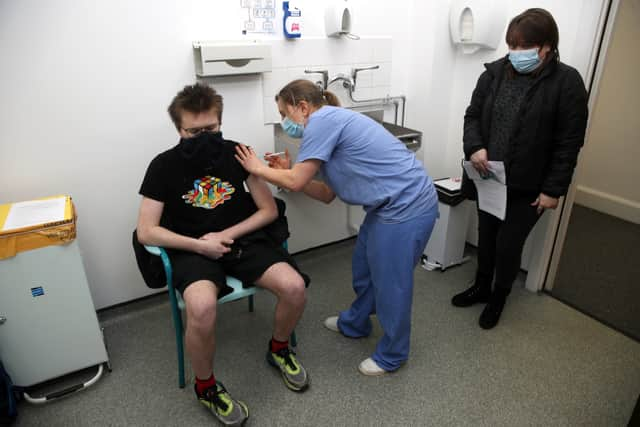LIVE UPDATES: Coronavirus NI - Should we be worried about the Indian and Nepal coronavirus variants?
and live on Freeview channel 276
Please scroll down for more on this story.
LIVE UPDATES: Coronavirus NI - Should we be worried about the Indian and Nepal coronavirus variants?
Key Events
- Pfizer/BioNTech Covid-19 vaccine has been approved for use for 12 to 15-year-olds
- Removing Portugal from green travel list 'an overreaction' says epidemiologist
- Three Covid-19 deaths recorded in Northern Ireland in last week, figures show
- There are now 12,431 confirmed cases of the Indian variant, also known as Delta, in the UK, up from 6,959 last week.
Should we be worried about the Indian and Nepal coronavirus variants?


New coronavirus cases involving the Indian variant have increased by 79% compared with last week, and the strain is now believed to be dominant in the UK.
There are now 12,431 confirmed cases of the Indian variant, also known as Delta, in the UK, up from 6,959 last week.
Early evidence from Public Health England (PHE) published on Thursday suggests this version of Covid-19 may lead to an increased risk of being admitted to hospital compared with the previously dominant Kent variant (Alpha).
Meanwhile, another coronavirus variant, thought to have originated in Nepal, has also been seen in the UK.
The so-called Nepal variant is believed to be a mutated version of the Indian variant, with a spike mutation, known as K417N.
Experts believe this mutation may have the potential to make vaccines less effective – although it is too early to tell without further investigations.
– Has the Indian variant spread throughout the country?
Of the 12,431 Indian variant cases so far confirmed in the UK, 10,797 are in England, 1,511 in Scotland, 97 in Wales and 26 in Northern Ireland.
In England, the cases are spread across the country, and the most affected areas include Bolton in Greater Manchester (2,149 cases), Blackburn with Darwen in Lancashire (724), Bedford (608), Leicester (349), Manchester (278) and Birmingham (223).
Dr Jenny Harries, chief executive of the UK Health Security Agency, said: “With this variant now dominant across the UK, it remains vital that we all continue to exercise as much caution as possible.
“The way to tackle variants is to tackle the transmission of Covid-19 as a whole.”
– Should we be worried about the Indian variant?
Professor Neil Ferguson, from Imperial College London, whose modelling was instrumental to the UK locking down in March 2020, said the Indian variant is anywhere between 30% and 100% more transmissible than the Kent variant.
He said 60% is “a good central estimate” at the moment, telling the BBC Radio 4’s Today programme: “Unfortunately, I mean, the news is not as positive as I would like on any respect about the Delta variant.”
Meanwhile, new data from the PHE suggests people are more at risk of hospital admission if infected with the variant – although a majority of admissions involve those who have not been vaccinated.
– What about the Nepal variant?
The Nepal variant contains the K417N mutation, which has also been found in the coronavirus strain first detected in South Africa (Beta).
Experts believe this mutation has the potential to allow the virus to evade protection from vaccines to some degree.
As the Indian variant appears to be more transmissible, scientists are carefully monitoring the K417N mutation.
– Will vaccines work against the Indian variant?
Meaghan Kall, an epidemiologist at the PHE, said 73% of the cases involving the Indian variant are in unvaccinated people, while only 3.7% cases are in people who have had both doses.
She said that only 5% (seven) hospital admissions were people who have been fully vaccinated, “suggesting that vaccination still appears to be making an impact on spread”.
Meanwhile, new laboratory data published on Thursday suggests that people who have received the Pfizer/BioNTech vaccine have fewer antibodies targeting the Indian variant – although real-world data is needed to confirm this.
Experts say that delivering second doses promptly and providing boosters to those with weakened immune systems will help keep hospital admissions low.
– What other variants of concern have been identified in the UK?
All viruses undergo small genetic changes as they make copies of themselves in the host.
Most of these mutations are harmless but some can make the disease more infectious or threatening, and evade protection gained through infection or vaccination.
The PHE has designated the Indian, Kent, South African, and Brazilian (Gamma) variants as being “of concern”.
Current vaccines have been designed for earlier versions of coronavirus, but scientists believe they should still work, although they may be less effective.
Most experts are confident that existing vaccines can be tweaked to better tackle emerging mutations.
The UK Government has a deal with biopharmaceutical company CureVac to develop vaccines against future variants, and has pre-ordered 50 million doses.
The Government has also begun negotiations with AstraZeneca to secure a “variant vaccine” that can tackle the South African variant.
Three Covid-19 deaths recorded in Northern Ireland in last week, figures show


Three Covid-19 linked deaths occurred in Northern Ireland in the latest week subjected to statistical analysis - writes David Young, PA.
The fatalities in the week May 22-28 took the total number of coronavirus-related deaths recorded by the Northern Ireland Statistics and Research Agency (Nisra) to 2,975.
The Nisra data provides a broader picture of the impact of Covid-19 than the death toll reported by Stormont’s Department of Health.
The department’s statistics focus primarily on hospital deaths and only include people who have tested positive for the virus.
Nisra obtains its data from death certificates on which Covid-19 is recorded as a factor by a medical professional, regardless of where the death took place or whether the patient tested positive.
The statistics agency reports its Covid-19 data with a week lag.
The department’s death toll stood at 2,153 on May 28.
Of the 2,975 deaths recorded by Nisra by May 28, 1,971 (66%) occurred in hospitals, 774 (26%) in care homes, 14 (0.5%) in hospices and 216 (7%) at residential addresses or other locations.
Nisra reported that up to May 28, the deaths of 1,011 care home residents were linked to Covid-19.
The figure includes the 774 deaths that took place in care homes, and a further 237 care home residents who died in hospital having been taken there for treatment.
Care home residents make up about 34% of deaths linked to Covid-19 in Northern Ireland, according to Nisra.
In the week of May 22-28, three coronavirus-linked deaths were officially registered in Northern Ireland, some of which took place before that week as deaths can take a number of days to register.
Pfizer/BioNTech Covid-19 vaccine has been approved for use for 12 to 15-year-olds


The Medicines and Healthcare products Regulatory Agency (MHRA) has approved the use of the Pfizer Covid-19 vaccine in 12 to 15-year-olds.
The MHRA said the decision follows a “rigorous review” of safety and effectiveness in that age group.
Dr June Raine, MHRA chief executive, said: “We have carefully reviewed clinical trial data in children aged 12 to 15 years and have concluded that the Pfizer/BioNTech Covid-19 vaccine is safe and effective in this age group and that the benefits of this vaccine outweigh any risk.
“We have in place a comprehensive safety surveillance strategy for monitoring the safety of all UK-approved Covid-19 vaccines and this surveillance will include the 12- to 15-year age group.
“No extension to an authorisation would be approved unless the expected standards of safety, quality and effectiveness have been met.
“It will now be for the Joint Committee on Vaccination and Immunisation (JCVI) to advise on whether this age group will be vaccinated as part of the deployment programme.”
LIVE UPDATES: Coronavirus NI - Removing Portugal from green travel list 'an overreaction' says epidemiologist


Moving Portugal off the UK’s green list is “an overreaction”, an epidemiologist in the popular holiday destination has said.
Professor Henrique Barros, president of Portugal’s National Health Council, said the overall situation in the country is “relatively stable”.
Communities Secretary Robert Jenrick said positive cases had doubled in the last three weeks in Portugal.
Prof Barros told Sky News: “We didn’t reach such an increase, except as I said in a specific area around Lisbon. The overall picture in the country, we didn’t reach such figures.”
Asked about Portugal being moved to the amber list for travel, he said: “I think it’s an overreaction. But of course you know that people moving from one country to the other, it’s obviously a risk for both countries, of course. We know that we should pay attention to the situation.”
He said it is mainly people aged under 40 and 30 where a rise in infections is being seen, and that with people over 50 “we have a very, very low incidence of cases”.
The health chief said hospital admissions at the present time are “very low”, at less than 25 people per million, while those in intensive care are at less than five people per million. Prof Barros stressed that officials in the country “pay a lot of attention” to monitoring the virus.
Comment Guidelines
National World encourages reader discussion on our stories. User feedback, insights and back-and-forth exchanges add a rich layer of context to reporting. Please review our Community Guidelines before commenting.
